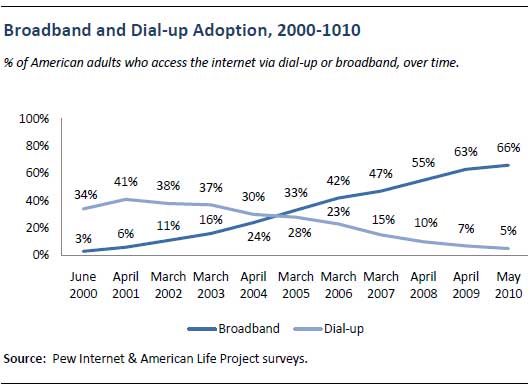The adoption of broadband Internet access slowed significantly over the last year, according to a new report by the Pew Internet & American Life Project.
Two-thirds of Americans (66%) now have a broadband connection at home, a number that is little changed from the 63 percent with a high-speed home connection at a similar point in 2009.

Most demographic groups experienced flat-to-modest broadband adoption growth over the last year. The notable exception to this trend came among African-Americans, who experienced 22% year-over-year broadband adoption growth.
*In 2009 65% of whites and 46% of African-Americans were broadband users
*In 2010 67% of whites and 56% of African-Americans are broadband users
By a 53%-41% margin, Americans say they do not believe that the spread of affordable broadband should be a major government priority.
Asked in a national phone survey by Pew if expanding affordable high-speed Internet access to everyone in the country should be a top priority for the federal government, important but a lower priority, not too important, or should it no be done, a majority of Americans chose the latter two options:
*26% of Americans say that expansion of affordable broadband access should not be attempted by government
*27% said it was "not too important" a priority
*30% said it was an important priority
*11% said it should be a top priority
While younger users (those under age 30) and African-Americans are the most likely to favor expanded government efforts, those who are not currently online are especially resistant to government involvement in broadband promotion. Fully 45% of non-users say government should not attempt to make affordable broadband available to everyone, while just 5% of those who don’t use the Internet say broadband access should be a top federal government priority.
"As broadband technologies have been adopted in the majority of American homes, a debate has arisen about the role of government in stepping in to ensure availability to high-speed internet access for all Americans," said Senior Research Specialist Aaron Smith, author of the Pew Internet Project’s new report.
"The majority think not, and the surprise is that non-users are the least inclined to think government has a role in the spread of broadband. It could be that the recession is causing Americans to prioritize other issues, or it could be general anti-government wariness. It could also stem from the fact that not many non-users are anxious to see government promoting technologies that they view as difficult to use and offering uncertain benefits"




 WebProNews is an iEntry Publication
WebProNews is an iEntry Publication